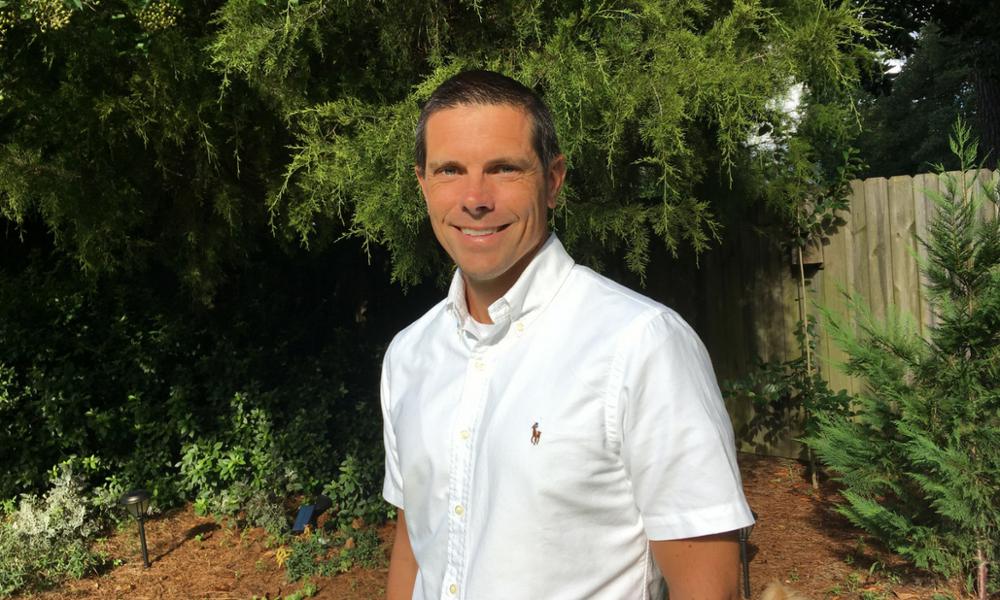Research Q&A with JMU Alumnus Russell Carlock
Research
SUMMARY: A Research & Scholarship Q&A with Russell Carlock, 2018 Virginia History Teacher of the Year and JMU graduate.
By Jake Krug & Benjamin Delp (’05 and ‘08), JMU Research & Scholarship
JMU Research & Scholarship recently interviewed Russell (Rusty) Carlock, an ESOL (English for Speakers of Other Languages) and Social Studies teacher at Albemarle High School, about the impact of research and scholarship on his education and career. Dr. Carlock graduated from James Madison University with a B.A. in English (with a Creative Writing Minor), and then went on to receive a Master’s from the University of Virginia and both a Master’s and Doctor of Education from Harvard University’s Graduate School of Education. Earlier this summer, Dr. Carlock was named the 2018 Virginia History Teacher of the Year, selected among 160 nominees from across the Commonwealth by the Virginia Department of Education and the Gilder Lehrman Institute of American History.
In the context of your profession, what value do you place on research?
When I approach a lesson or a unit of study as a classroom teacher, I look to pedagogical research to give me an understanding of how best to foster learning among my students. Since I teach students from a wide variety of educational and cultural backgrounds, it is helpful for me to survey the research on pedagogical strategies in order to offer multiple pathways to learn the content. In addition, research helps me and other classroom teachers to engage learners across the domains of family, community, and the school. I learn best practices for building partnerships with the family and community in order to effect positive social change and empower my students to become active citizens who advocate for themselves and their peers. Finally, as an administrator in a public school district, I used research to guide professional development for teachers and to create policies that advanced opportunities for students in our schools.
What are some interesting research topics you have pursued or are currently pursuing?
My greatest research interest currently is in community organizing among young people in schools. We have seen growth in youth organizing among students in recent years, and this connects to a long tradition of such organizing for change among students, including the Chicano Movement and the Civil Rights Movement. I am interested in learning about the social conditions in schools that lead to such organizing - especially in understanding the role of school leaders and teachers in supporting a school culture in which such organizing takes place and supports the civic engagement of all students across a variety of backgrounds.
If you were able to engage in research during your time at JMU, please describe that experience and any opportunities you had to work with the faculty. How did that research experience prepare you for your graduate studies?
My greatest preparation for research at JMU came through my participation in the Creative Writing Minor in the English Department. Professors like Lucy Corin and Mark Facknitz taught me the importance of audience, revision, and clarity in writing, and this has transferred into my writing for research. The writing workshop model used at JMU allowed us as students and professors to form a critical learning community committed to building innovation and collective improvement through detailed and honest feedback. Participating in this type of learning community prepared me for advanced research because an effective research team carries many of the same attributes fostered in the JMU English Department, including receptivity to feedback, an intense focus on completing projects successfully, and generating new ideas through deep discussion and professional camaraderie.
Can you speak to other experiences that influenced your decision to seek postgraduate education?
My research has focused on community organizing and civic action within education and these interests were cultivated first at JMU. While at JMU, I participated in activism organized through the Student Government Association and student-led groups such as Diogenes' Lantern and the Young Democratic Socialists in which students were successful in convincing university administration to adopt policies that reduced dependence on goods produced in sweatshop conditions overseas. We also supported a living wage for university employees and raised awareness of university contracts with businesses that profited from the expansion of private prisons. The culture at JMU was one that combined academic pursuits with creating real-world change, and I pursued this nexus of research and action in my postgraduate studies.
Do you have any advice for current JMU students who would like to pursue research?
My best preparation for advanced research was through participation in a focused learning community that sought to have real-world impact. My advice to current JMU students would be to seek out such a learning community at JMU, and if you cannot find such a community focused on the topics that engage you most, then seek to build such a community. Form connections with professors and other students who share your passions, build
